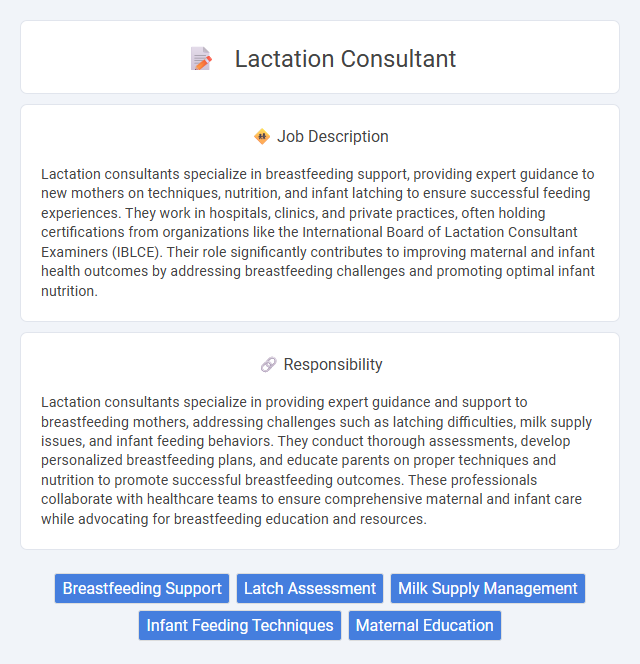
Lactation consultants specialize in breastfeeding support, providing expert guidance to new mothers on techniques, nutrition, and infant latching to ensure successful feeding experiences. They work in hospitals, clinics, and private practices, often holding certifications from organizations like the International Board of Lactation Consultant Examiners (IBLCE). Their role significantly contributes to improving maternal and infant health outcomes by addressing breastfeeding challenges and promoting optimal infant nutrition.
Individuals with strong communication skills and a passion for supporting new mothers are likely suitable for a lactation consultant role. Those who can handle emotionally sensitive situations with empathy and patience may thrive in this job. People lacking interest in healthcare or unwilling to manage irregular hours might find this career less compatible.
Qualification
Lactation consultants require specialized certifications such as the International Board Certified Lactation Consultant (IBCLC) credential, which demands comprehensive training and clinical experience in breastfeeding support. Candidates typically hold a background in healthcare fields like nursing or midwifery, complemented by courses in lactation physiology, counseling techniques, and newborn nutrition. Mastery of mother-infant breastfeeding challenges, effective communication, and evidence-based lactation management forms the core qualifications essential for this profession.
Responsibility
Lactation consultants specialize in providing expert guidance and support to breastfeeding mothers, addressing challenges such as latching difficulties, milk supply issues, and infant feeding behaviors. They conduct thorough assessments, develop personalized breastfeeding plans, and educate parents on proper techniques and nutrition to promote successful breastfeeding outcomes. These professionals collaborate with healthcare teams to ensure comprehensive maternal and infant care while advocating for breastfeeding education and resources.
Benefit
Lactation consultant jobs likely offer substantial benefits such as improved maternal and infant health outcomes, which may increase professional satisfaction and demand for expertise. Opportunities for flexible work schedules and diverse practice settings probably enhance work-life balance. Competitive salaries and the chance to support breastfeeding success could contribute to long-term career fulfillment.
Challenge
Lactation consultants likely face challenges related to addressing diverse breastfeeding difficulties among new mothers. The role often requires navigating sensitive emotional situations while providing evidence-based guidance tailored to individual needs. Balancing clinical expertise with empathetic communication may frequently test both knowledge and interpersonal skills.
Career Advancement
Lactation consultants can advance their careers by obtaining certifications such as the International Board Certified Lactation Consultant (IBCLC) credential, which enhances professional credibility and opens opportunities in healthcare settings. Expanding expertise in maternal and child health, conducting research, or engaging in public health education increases job prospects and potential for leadership roles. Pursuing advanced degrees in nursing, midwifery, or public health can facilitate transitions into administrative, teaching, or policy-making positions within maternal and infant care industries.
Key Terms
Breastfeeding Support
Lactation consultants provide specialized breastfeeding support to new mothers, offering guidance on proper latch techniques, milk supply management, and addressing common challenges such as nipple pain and engorgement. Their expertise helps improve breastfeeding outcomes and promotes infant nutrition and maternal health. These professionals often work in hospitals, clinics, and private practice, utilizing evidence-based practices to enhance lactation success.
Latch Assessment
Lactation consultants specialize in latch assessment to ensure effective breastfeeding by evaluating the infant's positioning and attachment to the breast, which is crucial for optimal milk transfer and maternal comfort. Accurate latch assessment helps identify issues such as nipple pain, insufficient milk intake, or tongue-tie, enabling tailored interventions for improved feeding outcomes. Expertise in this area supports both newborn nutrition and maternal health, promoting successful breastfeeding experiences.
Milk Supply Management
Lactation consultants specialize in milk supply management by assessing maternal factors that influence lactation and implementing personalized strategies to enhance milk production. They guide breastfeeding techniques, recommend nutritional adjustments, and address issues like latch difficulties and insufficient glandular tissue to optimize milk output. Their expertise supports both mothers and infants in achieving successful, sustained breastfeeding outcomes.
Infant Feeding Techniques
Lactation consultants specialize in optimizing infant feeding techniques to ensure successful breastfeeding and enhance newborn nutrition. They assess latch quality, manage breastfeeding challenges, and provide personalized guidance to improve milk transfer and infant weight gain. Expertise in infant feeding positions, tongue-tie assessments, and pumping strategies supports both mother and baby throughout the breastfeeding journey.
Maternal Education
Lactation consultants specialize in providing maternal education to support breastfeeding mothers through personalized guidance and evidence-based techniques. They enhance maternal knowledge on proper latching, milk production, and infant nutrition, promoting successful breastfeeding outcomes. Their expertise in maternal education reduces breastfeeding challenges and improves both mother and infant health.
 kuljobs.com
kuljobs.com